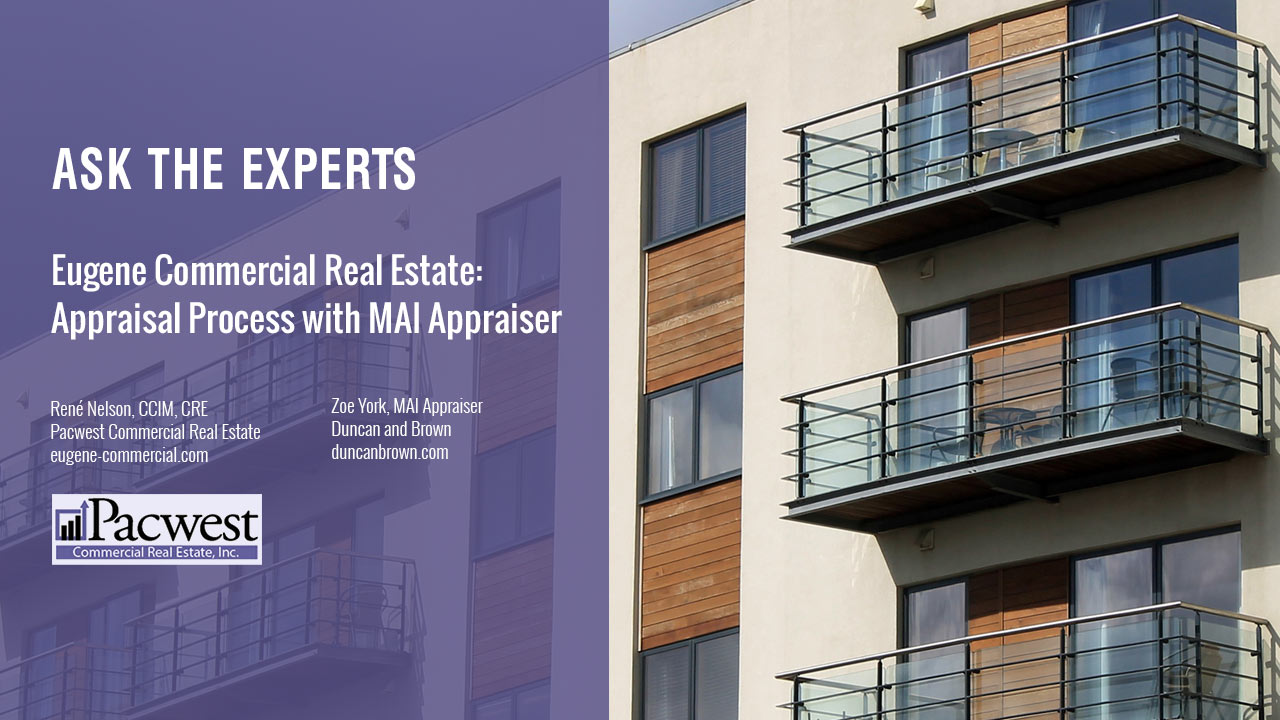René Nelson with Pacwest Commercial Real Estate asks the expert Zoe York, MIA Appraiser Duncan & Brown, about the appraisal process. They also discuss the MAI appraiser designation and how that benefits clients as well as the reason an individual in the Eugene commercial real estate market would contact her about an appraisal.
[embedyt]https://www.youtube.com/watch?v=v-Vn0r8mZXI[/embedyt]
Watch or Read
Rene Nelson: I know you’re an MAI appraiser. What does that designation mean?
Zoe York: MAI actually doesn’t stand for anything. It’s not an acronym, but it’s a designated member of the Appraisal Institute, a globally recognized organization of appraisers. When you’re an MAI member, you’ve reached the highest designation that you can get in this professional organization. To become an MAI, you have to have 4,500 hours of additional specialized experience above your typical license. You have to have several additional classes that you’ve taken, specialized advanced courses. You also have to take a two-day comprehensive exam and write a demonstration report. The demonstration report is really kind of like a thesis. All in all, it takes about four years above your typical license certification to reach the MAI designation.
Rene Nelson: Wow. And how long have you been an appraiser?
Zoe York: I’ve been licensed since 2011, and I’ve had my MAI since 2014. I’ve worked with Duncan & Brown since 2005. I started as an intern back when I was in high school.
Rene Nelson: Wow. That’s amazing. So talk to me about the appraisal process. What changes or difference do you see between private work versus a bank? I know the banks have a process they have to go through, right? How does that work?
 Understanding Appraisals in Eugene Commercial Real Estate
Understanding Appraisals in Eugene Commercial Real Estate
Zoe York: When I bid work for a bank, that’s exactly what I’m doing. For any job I tend to give a bid to either a private client or a bank. And I say, “This is how much it’s going to cost. This is how much time it’s going to take me.” Then they can either accept or reject that bid. When it comes to a bank, typically I’m one bid in a pool of multiple appraisers that are bidding for the same job. And the banks tend to do that because it’s not quite as strict as it is in residential work where it’s completely blind and they’re going through an intermediary. But, for the most part, they’re trying to keep the loan officers and the reviewers separate from the appraisers, so they’re not picking who they want to appraise the property.
Zoe York: Typically, it’s me and several other appraisers bidding for the same job, and we give our time and our fee, and the bank will take that time and fee and they’ll select based on their requirements for that particular loan. Sometimes they want the fastest, sometimes they want the cheapest, and always they want cheap and fast. But sometimes they kind of have some wiggle room in terms of who they’re selecting, and I’ve been told by some banks that it is completely blind; other banks will call after-the-fact and they might have a little bit of control over who they’re selecting because sometimes the property owner can say, “We want Duncan & Brown to do the appraisal.” Then the bank will do everything they can to try to facilitate that, but that’s not always something they can accommodate.
Zoe York: When it comes to private work, we’re working directly with clients. The client contacts me, I give them time and fee, and they either accept it or reject it. Typically, they’re not out there looking for other bids. I tend to prefer that kind of work because when I’m working directly with a private client, there aren’t not four different places where data can get lost or there can be miscommunication. It’s just me and the client, and there’s a little bit more of a personal relationship there. They tend to feel comfortable communicating with me, and we can really get the job done more efficiently with private work. Whereas, with bank work, there’s so many different parties involved and sometimes the data just doesn’t make its way down to me in a timely manner.
Rene Nelson: Why would a private individual, say, in the Eugene-Springfield market, contact you at about an appraisal? What are they typically trying to accomplish?
Zoe York: Most of the private work I do is estate work, so it will be for estate settlement purposes. Typically, their accountant will tell them to contact me, or the accountant or lawyer will contact me directly. Often with estate work, there might be a portfolio of properties, or we might be dealing with multiple siblings, but it’s usually the executor of the estate who will actually contact us or facilitate the appraisal. Other reasons we might do private work is somebody might come to us and they might want to get an appraisal done to establish a purchase price.
Zoe York: A lot of times, I will counsel against that, unless they really need it for purposes of negotiating among their family members or negotiating with a board. If they really need an appraisal, they need an unbiased opinion to establish a purchase price, then we do that. But sometimes if they’re just looking for a purchase price, I will refer them to a broker. A lot of times an appraisal is an overboard measure of trying to figure out what to sell your property for, particularly if it’s a type of property that there’s not a lot of data out there for.
For more information about investing in commercial real estate in Eugene, call me today: René Nelson, CCIM, (541) 912-6583 / [email protected] / www.eugene-commercial.com

Recent Comments